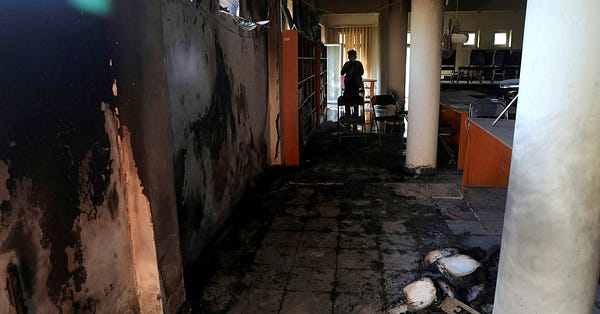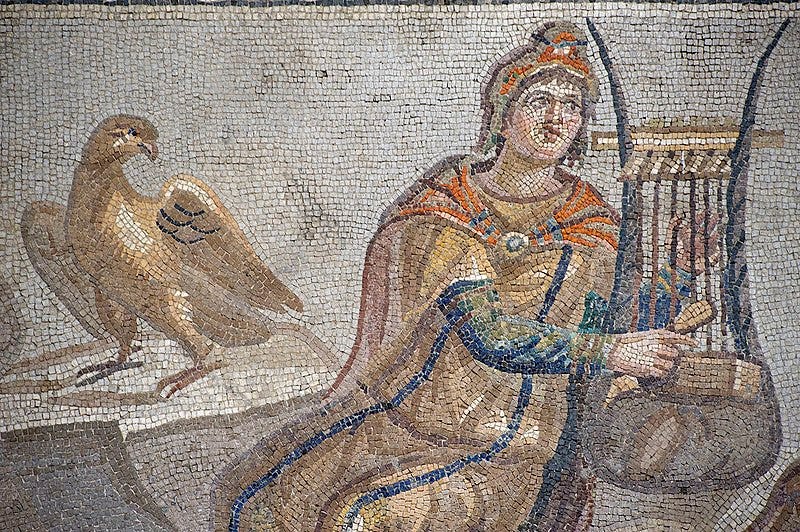
This week, Del A. Maticic remembers Ashley Simone and one of her writing methods, a post-Classics future is confronted, a unique shade of blue is found in ancient Nubia, archaeologists are digitally mapping Teotihuacán, saving the libraries of Afghanistan, and more.
In Memoriam: Ashley Simone by Del A. Maticic
Four Hundred Last Words for Ashley
By summer 2019, I was on the edge of an abyss. I passed my qualifying exams, but the dissertation proposal I was writing seemed to be going nowhere. Helplessness gave way to hopelessness, which I held at bay like Penelope by weaving and unweaving the same argument for months. I was as depressed as I’ve ever been.
When I told my dear friend, Ashley Simone, she had none of it. Ever practical, she suggested that each day, Monday through Friday, rain or shine, we each write 400 words until our respective projects were done. I proposed exchanging our 400 words every day—or, at the very latest, before sunrise the following morning—as additional accountability. She agreed, hesitantly, and the 400 Words-a-Day system, or WAD, was born.
Against all odds, I emerged from despair and wrote my proposal that summer. Thanks in large part to Ashley’s prodding encouragement, I rode the emotional wave of newfound creative flow. I even found a psychiatrist to help me claw my way out of my depression. I began a path of healing I would never have found without Ashley's stubborn positivity. Now I have an entire folder of small chunks of daily productivity, both mine and Ashley’s, to look back upon fondly. To this day I’ve continued following WAD, with other friends, and it has guided me and them through many an inspiration desert.
Now she's gone, and words fail afresh. What now? Keep writing, honor her memory, live by her admirable mantra that "academia is a team sport"? Under normal writerly circumstances, I’d quote Augustine on loss, Derrida on Cicero on friendship, or Vergil on sadness. I'd pound out 400 unkempt words just to make it through the day, vindicating my expertise and leaning on an ancient quotation to say what I cannot. But I don't want to. How can I, when my friend is no longer there to reciprocate?
One of the hardest parts of losing Ashley will be staying this course and drafting into a void that I know won’t hold me accountable in the same way. But I know it must be done. Today I do my duty by sharing these 400 words with you. Perhaps our words-a-day method may one day help you out of a rut.
And if you have more words for me, Ashley, pass them along. You have until dawn.
Another remembrance by Vanessa Stovall. S·T·T·L

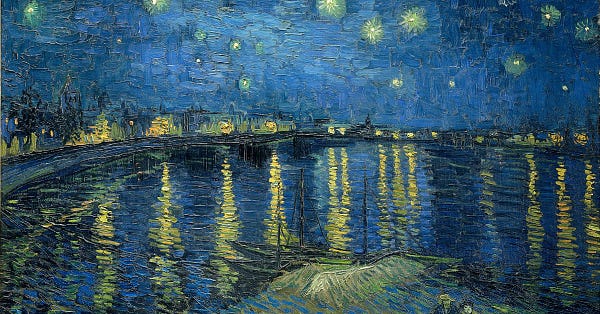
Seen in the Twitterverse
In Perspectives on History, the American Historical Association’s (AHA) public-facing journal, ancient historian Evan Jewell discusses whether we are now facing a “Post-Classics Future”. He also ponders whether moving from a Classics to a History Department may bring about some distinct benefits in the coming years.

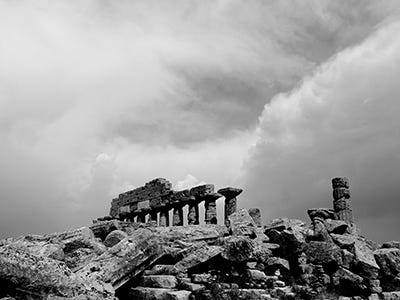
A new open access article focused on Amara West (Nubia, modern Sudan) turns up a unique shade of blue left on ancient paint palettes and a grindstone:

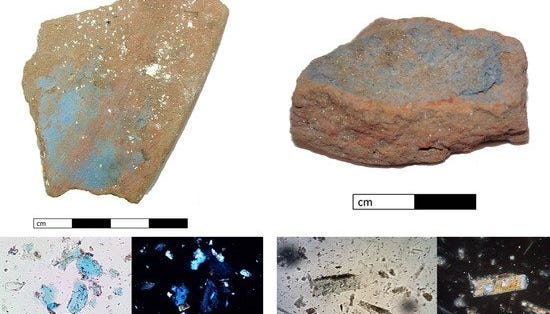
Over at Hyperallergic, Valentina Di Liscia discusses how aerial scanning technology is advancing the mapping of Teotihuacán. Hyperallergic spoke to the authors of a new open access article on the city, Nawa Sugiyama, Saburo Sugiyama, Tanya Catignani, Adrian S. Z. Chase, and Juan C. Fernandez-Diaz, about their creation of a geospatial database of the Teotihuacán Valley that can trace anthropogenic alterations.

A new open access article on DNA and the Etruscans was published in Science Advances. In it, archaeogeneticists at the Max Planck Institute studied the “genomic time transect of 82 individuals spanning almost two millennia (800 BCE to 1000 CE).” While there is marked homogeneity in the Republican period, “By sharp contrast, all analyzed individuals from the Roman Imperial and Late Antique periods (1 to 500 CE) show a marked shift in ancestry toward populations of the eastern Mediterranean.” Context and analysis in the subsequent writeup in the Science online magazine does, however, provide some important caveats to the use of such genetic studies.
The discovery that the Etruscans were as local as their neighbors, even if their language was unrelated, is a welcome reminder that genes and culture aren’t synonymous, says Anthony Tuck, an archaeologist at the University of Massachusetts, Amherst, who was not involved in the research. That’s something that’s often lost in recent studies of prehistoric migrations, he says, as well as in modern discourse about race and ethnicity. “We’ve been too simplistic in assuming genes equal culture,” Tuck says. “This data shows people can engage in cultural forms that aren’t related to their genetic makeup.”
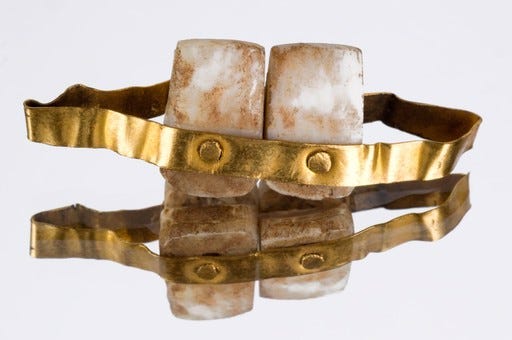
In the Financial Times, librarian Richard Ovenden investigates “The Battle for Afghanistan’s Libraries” and underscores the necessity for freedom of information as tools of justice, peace, and equity:
The public library in Kabul and the National Archives there now have a limited staff presence, but no services are provided. University libraries are all currently closed, and the student body is being divided along gender lines. There are not many libraries outside Kabul, and they are closed: many government employees are uncertain about their future. Female employees, such a strength of Afghanistan’s libraries, are not allowed to work.
Excavation Opportunities and Field Schools
Melite Civitas Romana Project – Excavations At The Roman Domus Of Rabat (Malta) in 2022. “The field school entails 4 weeks of archaeological fieldwork, classification, analysis and emergency restoration of ancient artifacts and application of 3D scanning and digital photogrammetry to archaeological contexts.”


View an interactive map of all fieldwork opportunities and calls at the AIA website.
New Online Journal Issues @YaleClassicsLib
Ancient Philosophy Today: Dialogi Vol. 3, No. 2 (October 2021)
The Catholic Biblical Quarterly Vol. 83, No. 4 (October 2021)
Classical Philology Vol. 116, No. 4 (October 2021)
NB: Cosmogonies of the Bound: Titans, Giants, and Early Greek Binding Spells by Jessica Lamont
Dialogues d'histoire ancienne Vol. 23 Supplément (2021) Colonies, territoires et statuts : nouvelles approches
Renaissance Quarterly Vol. 74, No. 2 (Fall 2021)
NB: Rewriting the Virgilian Career: The Scaligers and the Appendix Vergiliana by Sheldon Brammall
Rhizomata Vol.9, No. 1 (2021)
Gnomon Vol. 93, No. 6 (2021)
Orientalistische Literaturzeitung Vol. 116, No. 2 (2021)
Pitches:
The Public Books section "Antiquities" is currently taking pitches — as is our “Pasts Imperfect” column at the LA Review of Books, using this form.







